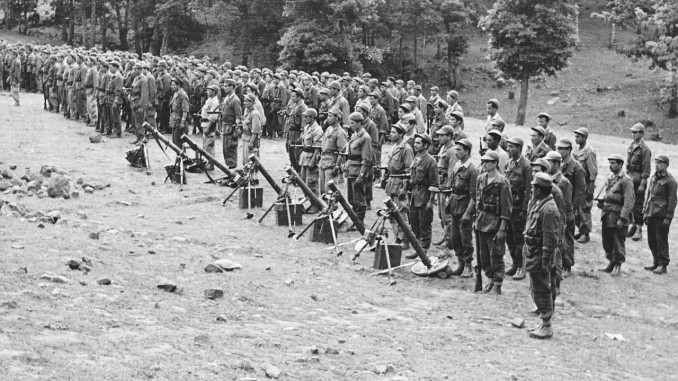
On November 1, 1954, the Algerian Revolution began when the Algerian National Liberation Front (FLN) began a guerilla warfare campaign against French colonial military forces in Algeria. The revolution, also known as the Algerian War of Independence, concluded in 1962 when France was forced to withdraw their troops from Algeria.
The aim of the FLN was independence from France, which had conquered Algeria in 1834. For the next century Algeria was a colony of France, which ruled the Algerian people with extreme brutality, massacring entire tribes and using scorched-earth strategies to obliterate large swaths of agricultural land. The French occupiers made the Algerians second-class citizens in their own land in an apartheid-like regime, with the 1.4 million European (mostly French) settlers enjoying political and economic rights that were denied the native Algerian population which in 1950 numbered just over 9 million.
During the War of Independence, the French occupying forces resorted to even more extreme brutality in their attempt to put down the FLN-led anti-colonial uprising. They killed between 500,000 and one million native Algerians, and used torture, mass incarceration, and rape as weapons of counterinsurgency. The French police even shot down Algerian expats in Paris who marched in protest against French involvement in the war.
The FLN had substantial influence in Algerian labor unions, and called for a general strike in January 1957, which was violently put down by the French soldiers (many of whom had only recently arrived in north Africa after leaving Vietnam, another French colony that had just defeated the French). The intensified military conflict culminated in the famous Battle of Algiers. Although the Algerian workers and rebels were defeated militarily in that battle, the mass involvement of the Algerian working class brought wide international attention to the war and increased the pressure on France to pull out of Algeria. It also triggered an internal conflict in France that led to the dissolution of the French government in 1958 and the creation of a new government (the so-called “Fifth Republic”) under Charles de Gaulle, who further ramped up military suppression in Algeria.
International pressure continued to mount against France, however, and in 1961 de Gaulle’s government was forced to accede to a cease-fire with the FLN. In 1962 Algeria was finally granted independence, although with some major economic concessions: France was to retain its military presence in the country, as well as its exploitation of Algerian oil.
The Algerian Revolution exposed to the world the brutality of the so-called “democratic” capitalist states like France, and the genocidal violence they will resort to in desperate efforts to hold on to their colonies. The same hypocritical pretensions are true for the United States: the ruling capitalists of this country dominate the resources and labor of many countries worldwide – whether they are officially colonies of the US (like Puerto Rico) or “independent” countries that are subject to the control of American corporations and banks. Behind the capitalist lies about “freedom” and “democracy” are the realities of brutal exploitation and genocide.
The Algerian Revolution shook off French colonialism in that nation, delivering a blow to the French capitalists who profited from exploiting Algerian workers. But the hardest task of all remains: to shake off the capitalist class which exploits the workers of all countries.




